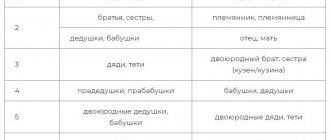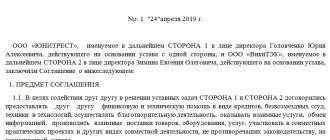If a citizen of the Russian Federation has health problems that provoke restrictions in terms of performing certain tasks or leading a normal lifestyle, he may receive a disability group. In this case, it is not the disease itself that is important, but its effect on the condition, on daily functionality, etc. When the group is received (in our case, in this article we are talking about disability group 3), a person with disabilities receives a pension, various benefits and can take advantage of the preferences provided by law. Next, we will tell you in detail about the list of ailments that allow you to obtain the status of “disabled” and how it all turns out from the point of view of social security.
Documents for registration of 3rd disability group
Article No. 7 of the Federal Law “On Social Protection of Disabled Persons in the Russian Federation” No. 181-FZ obliges a potential disabled person to undergo a medical and social examination (MSE), based on the results of which the commission members will give a group, focusing both on the state of health and other significant factors. But to pass the ITU, you need to prepare documents. First of all, you will need a referral from a doctor stating:
- health status and compensatory capabilities of the body;
- degree of dysfunction;
- a list of rehabilitation measures that were carried out for the purpose of recovery.
You can get a referral from a clinic, social security or the Pension Fund. The last two organizations require medical documents as proof that the applicant’s health is not all right. If for some reason it was not possible to take the referral, you can request a refusal at the place where the corresponding paper was not issued, in order to independently contact the ITU bureau with this refusal. Next, members of the special commission will assess the extent of restrictions.
But in addition to the direction, you will need documents such as a certificate of income, a work book, and, of course, a passport (photocopy and original). You cannot do without an outpatient card and an application (instead of a potential disabled person, by the way, his representative by proxy can handle the paperwork). If the applicant is studying or working, a reference from the educational institution or employer is required. When it comes to cases of loss of health at work, you will need a certificate of industrial injury, etc.
Conditions for assigning disability
Violations of body functions are expressed to varying degrees.
| Degree of expression | Scope of violation | Deviation range, % | Reason for violation |
| I | Minor | 10-30 | Diseases, injuries, defects |
| II | Moderate | 40-60 | |
| III | Expressed | 70-80 | |
| IV | Significant | 90-100 |
The necessary criterion for obtaining disability is a degree of severity of health impairment of 2 or higher in the range from 40 to 100%.
Depending on how severe the degree of deviation from normal functioning is, the following are provided:
- For adults - disability group (I, II, III).
- For persons under 18 years of age - the category “disabled child”.
Assignment to a specific group occurs after establishing the status according to certain criteria from Order No. 1024n. It contains a complete list of diseases for obtaining disability in 2021 for all groups.
| Disability group | Degree of expression | Deviation range, % | Reason for violation |
| I | IV | 90-100 | Diseases, injuries, defects |
| II | III | 70-80 | |
| III | II | 40-60 | |
| Disabled child | II, III, IV | 40-100 |
Passage and results of ITU
If a person is seriously ill, you can conduct an examination at home, or, if your health is not so complicated, at the office at your place of residence.
At ITU, commission members examine a potential disabled person, study the social and living conditions in which he lives. Labor capabilities and psychological characteristics are also taken into account. During the examination, a protocol is drawn up in the form enshrined in the Order of the Ministry of Labor of Russia dated October 17, 2012 No. 322n. The protocol includes:
- the date when the application for passing the ITU was submitted;
- day of the expert review;
- time of examination of the patient;
- applicant’s data, from full name to marital status;
- number of family members with their characteristics;
- information about the housing where the applicant is located;
- place, purpose and grounds for conducting the examination;
- terms of relevance of the assigned disability;
- examination results and conclusion;
- the reasons why a person acquired the status of a disabled person;
- signatures of ITU specialists, including the head of the bureau.
Based on the results of the ITU, an act is drawn up and information about the disabled person is also written down in it, and the cause of the disability is indicated with the types and degree of limitations.
For how long is the third group given?
Don’t forget to set the date for the next commission - for group 3, re-examination takes place once a year.
If the assignment of the group was provided, a mark is placed about this. Important
: if a citizen with a disability does not appear at the ITU commission or the commission does not find grounds for extending the disability, then the citizen loses the status of a disabled person and is deprived of all privileges in the form of benefits and payments.
What does disability give?
Disability is the status of an individual, which is acquired in connection with deviations in his state of health, accompanied by a persistent disorder of body functions due to illness or injury. The law established a list of diseases for which the status of a disabled person is granted, and the rules for obtaining it. The status of a disabled person makes it possible to receive support measures established by the state - cash payments, free medicines, tax, labor or other benefits.
| Support measure | Characteristics | Base |
| Pension provision | Insurance part of the pension (if you have even 1 day of service without reference to age) | Art. 9 Federal Law No. 400-FZ dated December 28, 2013 |
| Social pension (in the absence of grounds for assigning insurance) | Art. 11 Federal Law No. 166-FZ dated December 15, 2001 | |
| EDV | Indexed annually. Installed when refusing a set of social services. The payment amount is:
| Art. 28.1 Federal Law No. 181-FZ dated November 24, 1995 |
| Set of social services | Prescription medications, sanatorium-resort vouchers by referral, travel by suburban or intercity transport to the place of treatment and back | Art. 6.1 Federal Law No. 178-FZ dated 17.97.1999 |
| In the world of work | Shortened working week - 35 hours (for grades I and II) | Art. 92 Labor Code of the Russian Federation |
| Length of working day, shifts according to medical indications | Art. 94 Labor Code of the Russian Federation | |
| Admission to night and overtime work only with the consent of the disabled person | Art. 96, 99 Labor Code of the Russian Federation | |
| Work on weekends and holidays in the absence of medical prohibitions | Art. 113 Labor Code of the Russian Federation | |
| Vacation at your own expense up to 60 calendar days per year at a time convenient for the disabled person | Art. 128 Labor Code of the Russian Federation | |
| In the field of education | Admission to universities according to a quota (disabled people of grades I and II, from childhood, with war trauma) | Art. 71 Federal Law No. 273-FZ dated December 29, 2012 |
| In the field of employment | Employer quotas for jobs | Federal Law No. 181-FZ |
| Tax | Deduction in the amount of 500 rubles. for each month of the calendar year in terms of income that is subject to personal income tax | Art. 224 Tax Code of the Russian Federation |
| Reduction of the tax base for land tax by the cadastral value of 600 m² of land area owned by a disabled person since childhood | Art. 391 Tax Code of the Russian Federation | |
| Exemption of disabled people from childhood from property tax (in part 1 of each type of taxation object) | Art. 407 Tax Code of the Russian Federation |
Payments to disabled people of group 3. Pension amount and daily allowance
According to Federal Law 181-FZ “On the social protection of disabled people in the Russian Federation”, each disabled person of group 3 receives payments (EDV) every month from the Pension Fund. To apply for funds, you need to come to the fund branch at your place of residence with documents confirming your disability. From February 1, 2021, the amount of the annually indexed EDV for group 3
is
2336.70 rubles
.
Plus, there is a social pension
, which at the beginning of 2021 reached
4927.28 rubles
for category 3 disabled people.
Working conditions for disabled people of 2nd degree OST
If disability does not allow you to work without additional help, this is a 2nd degree restriction on work activity. The IPRA contains recommendations for arranging the workplace with specialized technical means. These are various indicators, devices for controlling equipment, etc. The employer is obliged to arrange the workplace of a disabled person taking into account his individual capabilities. The number of such places is established within the quotas determined by the constituent entity of the Russian Federation (Article 22-22 No. 181-FZ).
Labor benefits
The benefits enjoyed by such employed people are similar to the previous ones, with the exception of the length of working hours. In accordance with the Labor Code, the working week of a group 2 disabled person is reduced to 35 hours a week while maintaining full earnings.
Benefits for disability group 3
Decree of the Government of the Russian Federation dated July 30, 1994 No. 890 gives the right to an unemployed person with disabilities to purchase medicines at discounts or receive them free of charge with a doctor’s prescription.
In addition, an opportunity has been created to travel free of charge on city public transport using a special ID. There are discounts for people with disabilities when using river, air or railway transport. If the holder of group 3 enters a university or other educational institution, with good passing scores he can pass without competition. Also, let’s not forget about the benefits for sanatorium-resort treatment - vouchers are periodically issued through social security free of charge to maintain health at a stable or good level, as far as possible for a particular disabled person.
Instructions for registering status
To become disabled, you need to fulfill the conditions and take certain actions for this. This is due to state control over the provision of social assistance to citizens. To register and receive a disability, you must go through the following steps:
- Referral to a professional medical center from the attending physician.
- Collect a list of documents for examination.
- Undergo examinations in a hospital setting.
- Arrive at the medical examination for examination in order to receive disability status.
The medical center is found by the attending physician or the citizen himself. It is worth considering that the institution has the right to conduct an examination to award disability.
Employment
Disability of this group assumes residual ability to work. It means the possibility:
- work part-time;
- avoid a probationary period and start working immediately;
- work full time, but not permanently;
- work in areas that require less high qualifications.
Fact: Among other things, persons with disabilities can count on preferential interest rates - in addition to the basic salary.
Which work option is optimal for the patient is written in the medical examination report. It all depends on his state of health.
The employment of persons with disabilities of the third group is secured on legal grounds. According to Russian regulations, everyone should have the opportunity to work. The Labor Code states that when hiring a person, the company does not have the right to take his health problems as criteria.
However, the area of work activity is difficult to control. Therefore, certain requirements were put forward, enshrined in law:
- territorial bodies are obliged to provide a minimum number of places for persons with disabilities of one or another group;
- State authorities are required to establish a minimum quota for employees with disabilities in companies employing more than 100 people.
These requirements do not apply to small organizations, as well as to enterprises founded by disabled people.
Local employment centers must ensure compliance with the requirements. You can also get information about which companies have vacancies and whether you can actually get a job there with a disability.
After installing a disabled person, the employer is obliged to create comfortable conditions for him. The latter include individual rehabilitation programs, workplace equipment and training.
If the company fails to comply with social security requirements, it faces a fine. More information about working and rest conditions for persons with disabilities can be found in Article 287.
What benefits are provided?
Group 3 disability prevents a person from leading a normal life, so it involves the provision of several types of benefits. Among them:
- reduction of working hours without changing wages;
- more vacation days per year;
- 50% on the purchase of prescription medications necessary for treatment;
- 50% for payment of housing and communal services;
- insurance and social payments;
- educational benefits.
Thus, group 3 disability implies serious impairment of the body’s functioning, despite the fact that the person retains the ability to live independently. Disability group 3 is assigned to a specified list of diseases, the treatment of which is facilitated by the benefits received.
How is the pension calculated?
Since April 2021, disabled people of the third group receive a social pension in the amount of 4,508 rubles. The pension is calculated monthly.
Payment amount
In addition to the social pension, disabled people of the third group can also receive one-time payments, the amount of which for 2021 is 2162 rubles. To receive such a payment, a citizen must provide the following documents to the Pension Fund:
- passport;
- certificate of disability;
- pension insurance certificate.
Features for certain categories of citizens
There are categories of citizens who are entitled to special benefits.
Disabled since childhood
If a citizen received the status of a disabled person before reaching the age of majority, he receives a special status.
Citizens who have received the status of disabled persons before reaching the age of majority have the right to:
- pension;
- exemption from vehicle taxes;
- free rehabilitation means;
- compensation of 50% of the cost of housing and communal services.
Invalids of war
Disabled war veterans have the right to:
- pension benefits;
- provision of free housing;
- extraordinary telephone installation;
- advantages for admission to various cooperatives;
- compensation for housing and communal services in the amount of 50% of the cost.
Disabled workers
Disabled workers have the right not to confirm their disability group annually.
A disabled person has the right to:
- receiving subsidies to improve living conditions;
- material payments for the purchase of housing;
- lump sum payment upon retirement. How much the payment will be depends on the disabled person’s salary.
Main aspects
The status of a disabled person is needed in order to receive from the state not only material, but also social support. At the same time, disabled people of the third group are considered the “lightest”, therefore they receive minimal benefits.
What it is
As mentioned above, disability is a persistent limitation in life activity associated with a violation of any aspect of the functioning of the body. Russian legislation provides for three degrees of disability:
- 1st degree . The most severe health disorders, in the presence of which adaptation is significantly impaired. Citizens who have received first-degree disability are entitled to maximum benefits;
- 2nd degree . Includes impairments of moderate severity;
- 3rd degree . The violations are minimal, but they still lead to disruption of functioning and lead to a change in the social status of a person, and therefore he requires social and material support.
List of diseases
Diseases, the presence of which can be assigned to the third disability group, can be divided into several categories:
- diseases of internal organs, including malignant tumors;
- impairment of motor function, vision or hearing;
- diseases associated with a person’s mental health and reducing his ability to care for or control himself;
- pathologies of the cardiovascular system;
- diabetes.
The list of diseases for assigning group 3 disability is regulated by federal laws.
Useful article: Hearing disability
Third group disability criteria
Order of the Ministry of Labor No. 1024n specifies criteria that allow, during a medical and social examination, to assign a citizen the status of a disabled person of the third group.
The main criterion is the severity of the existing dysfunctions of the body, which can vary from mild to severe.
Important! After determining the degree of disability, if his health condition worsens, a citizen has the right to apply for a re-examination.
How to calculate correctly
In order to calculate a pension, data is required on the citizen’s work experience, working conditions, average salary, etc.
In general, it is calculated using the formula:
P = BC+MF+LF, where:
- P - labor pension;
- BC - base part;
- SCh - insurance part;
- NC is the funded part of the pension.
If there is a disability, the insurance portion is calculated using the formula:
SP = PC/(TxK). The formula includes:
- PC - estimated pension capital;
- T - payment period;
- K is the ratio of the length of work experience to 180 months.
Degrees
Violations have several degrees. In the third disability group there are three of them.
Fact: Some sources distinguish four degrees, where the fourth corresponds to the complete incapacity of the individual.
The degrees determine the level of disability. This determines what professions and types of work activities the patient will be allowed to do.
1st degree
In this case, disability is expressed by minor disruptions in the body.
The first degree is awarded to those persons who:
- can work in their specialty, but with a limited amount of work;
- can work in their profession, but with reduced qualifications;
- cannot work in their specialty, but are able to do this when changing professions or under other production conditions.
The first option is more common.
2nd degree
Moderate stage of disability.
People with the second degree of disability are able to work in the special conditions created for them. In an equipped place, as well as with the help of additional means or other people.
Another option for Stage 2 individuals is working from home.
3rd degree
Group 3 and degree 3 disability are pronounced deviations. It is received by a person whose activities are almost completely limited.
Persons with the third stage are contraindicated in almost any work. This means that their state of health does not allow them to do even simple work.
Such people are often assigned a non-working disability group.











